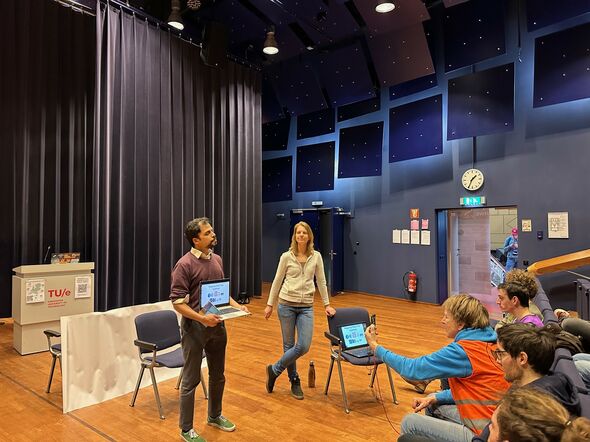
- The University
- 07/03/2024
Transparency about fossil projects through WOO request
Mapping Fossil Ties has created a website containing data on universities’ ties to the fossil industry. This data was made available through a request filed under the Open Government Act (WOO request). TU/e has also provided data. But what exactly are fossil projects? Where do you draw the line in that definition, since fossil is part of almost everything around us?
Aaron Pereira of the Mapping Fossil Ties (MFT) coalition explains that, while the results of the WOO requests are not complete yet, he has already received some indexes and a part of the documents from several universities, including TU/e.
“In these documents, we find, among other things, the names of external parties in the fossil fuel industry and project descriptions. The latter are a little too brief in places and we have asked additional questions about those. For some projects we already know enough from the descriptions, for others we think the documents could yield interesting information, for example about the motivation of the company and the university to undertake these projects, or how much input the company had in terms of defining the research question. We hope to see these things in the documents, but chances are that the financial figures will initially be redacted. If they are, we will file an objection, because we believe the financial figures should be public.”
The companies involved will first get a chance to see exactly what will become public and can still lodge an objection. After that, TU/e must decide what else should be made public based on the Open Government Act (sections 5.1 and 5.2, Ed.). The same applies to the other universities where they have filed the requests. Last week, it became clear that TU Delft has received money for oil and gas research in recent years. “Universities lack a good overview of all projects with fossil partners, as not everything is registered centrally,” Pereira observed during the investigation he is working on with the MFT coalition. All the information the coalition obtains is made available for everyone to see on their website www.mappingfossilties.org.

Improved discussion through availability of facts
Pereira of Solid Sustainability, a member of the coalition: “As a coalition, we don’t protest, we investigate the ties between universities and the fossil industry. The data we collect and disclose are important for informed discussions about these ties. Without facts, there can be no proper discussion.” He emphasizes that it is not just about the money flowing from the fossil industry to universities. “It’s certainly important to know, but what’s even more interesting for fossil companies is being associated with universities and how that affects their reputation. All of a sudden, you become a credible partner. And you gain access to research results. Greenwashing is prevalent in this industry,” says Pereira. “Data from Leiden University even revealed that the project application stated that Aramco, Saudi Arabia’s largest oil company, could take advantage of Leiden University’s good reputation.” He also brought up this example during the debate at TU/e where he showed the relevant project communication as proof, leaving the audience completely silent.
Examples of impeding projects
Pereira: “Universities claim to be of great social importance. If that’s the case, you also have a major responsibility, such as combating the climate crisis. If you then choose to partner with fossil companies in projects that don’t counteract that or worse, impede progress, it's time for you to take responsibility.” And these impeding projects certainly exist.
“One example is a project on “affordable LNG”; liquid gas is sometimes presented as a “transition fuel” but in actuality, it is a fossil fuel that has a greater climate impact than previously thought due to leaks during transport and storage. In addition, we also look for projects that reek of greenwashing. Take, for example, research into recycling plastic; while it sounds environmentally friendly, it diverts attention away from more effective solutions that actually reduce plastic production.”
In the coming weeks and months, the coalition will continue to add new data to the database.
Discussion